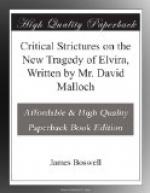Though in general this Tragedy is colder than the most extreme Parts of Nova Zembla,[D] yet we now and then feel a Warmth, but it is such a Warmth or Glow rather, as is sometimes produced by the Handling of Snow.
Bad as this Play is, yet will the Author have the Profits of his Three Nights: Few on the First Night having either Taste or Spirit to express their Disapprobation. Like the Rascals who plundered Lisbon after the Earthquake, Mr. David Malloch will extract Guineas out of Rubbish.
We shall now give, in a few Words, the Quintessence of this Play. Monarchs ought to be just. Heroes are bad Men. Husbands ought to die for their Wives, Wives for their Husbands. We ought to govern our Passions. And the Sun shines on all alike. A few of these new Remarks form the Sum total of this contemptible Piece.
After the Play we were entertained with an Epilogue fraught with Humour, and spoken with Spirit. There was a Simile of a Bundle of Twigs formed into a Rod, which seemed to convey a delicate Allusion to Mr. Malloch’s original Profession,[E] and some of the Lines contained an exquisite and severe Criticism on the Play itself.
Amidst all the harshness inspired by a real Feeling of the Dulness of the Composition itself, it would be unjust not to bestow the highest Applause on the principal Performers, by the Energy of whose Action even Dulness was sometimes rendered respectable. We were sorry to find such great Talents so very ill employed. The melting Tones of a Cibber should make every Eye stream with Tears. Pritchard should always elevate. Garrick give Strength and Majesty to the Scene. Let us soften at the keen Distress of a Belvidera; let our Souls rise with the Dignity of an Elizabeth; let us tremble at the wild Madness of a Lear;[F] but let us not Yawn at the Stupidity of uninteresting Characters.
FINIS
* * * * *
NOTES ON CRITICAL STRICTURES
[Footnote A: (P. 5) Advertisement. Johnson’s dictum first appeared in the abridgment of his dictionary, 1756, under Alias, which he defined as “A Latin word signifying otherwise; as Mallet alias Mallock; that is, otherwise Mallock.” In four places in his Memorials and Letters Relating to the History of Britain in the Reign of James the First (1762) Dalrymple had given Mallet “his real name”; he had repented after the sheets were printed and had inserted a corrigendum, “For Malloch, r. Mallet,” which only made matters worse. See The Yale Edition of Horace Walpole’s Correspondence, iv. 78 n. 17. Dalrymple chided the authors of Critical Strictures gently for using his name, and said he was sorry for having thus yielded to a private pique (LJ, p. 190 n. 6). But the matter remained of interest to him, for as late as 1783 he sent Johnson a copy of one of Mallet’s earliest productions, the title-page of which bore the name in its original spelling (Life, iv. 216-217; see also Private Papers of James Boswell ... in the Collection of ... R.H. Isham, ed. Geoffrey Scott and F.A. Pottle, 18 vols., Privately Printed, 1928-1934, xv. 208).]




